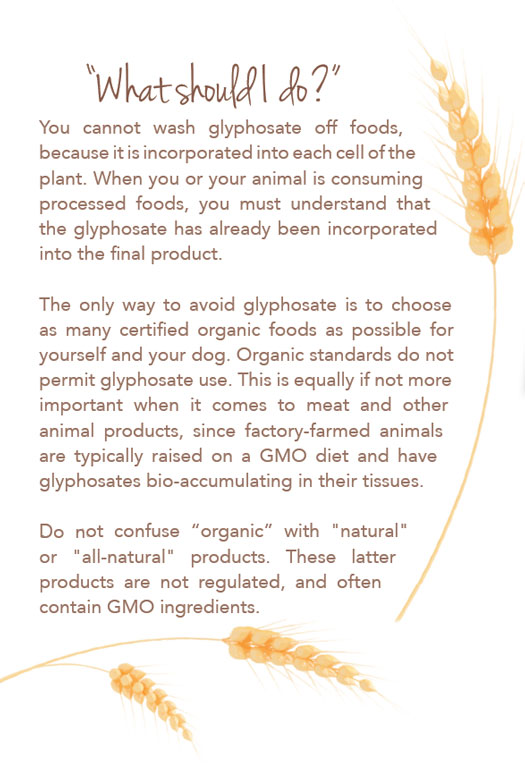People and animals have been eating wheat for thousands of years, so why has it started causing health issues in so many? The answer may shock you.
Wheat has been a staple grain for centuries. It forms the basis for a large number of foods eaten by both people and animals. Yet it’s only relatively recently that we and our companion animals have started suffering from health problems caused by ingesting wheat. Why did this grain suddenly become the villain of the food pyramid, given its long history in the diets of both humans and dogs?
Domesticated dogs adapted to eat wheat
Many say that wheat and other grains aren’t a natural part of the canine diet, which is why they cause health problems in some dogs. But domesticated dogs have been eating many of the same foods as humans for 11,000 years, and those foods include grains. A lot can change in the canine genetic makeup over the course of 110 centuries. The truth is, our dogs have co-evolved along with us, their bodies adapting so they could digest a lot of the same foods we do.
From early on, novel adaptations in canine genes allowed the ancestors of modern dogs to digest and assimilate the starches found in wheat and other grains. Some pretty impressive genetic research has been done in Sweden on this topic. Eric Axelsson, an evolutionary geneticist at Uppsala University, compared the DNA of dogs and wolves. He found that unlike wolves, dogs have developed genes for digesting starch. Dogs have up to 30 copies of the gene that makes amylase, a protein that starts the breakdown of starch in the intestines, while wolves have only two copies. The multiple genes for amylase are also 28 times more active in dogs, demonstrating that our canine friends are many times better at digesting starches than wolves are.
There’s another gene that codes for an additional enzyme called maltase, important in the digestion of starch. The Swedish study found that compared to wolves, dogs produce a longer version of the maltase digestive enzyme (the same type seen in herbivores such as cows and rabbits), making it even more efficient in its ability to digest starch.
The bottom line is that dogs can and did digest and eat starches, and that they developed enzymes and adapted to a diet that’s quite similar to a balanced human diet. So why are wheat and other grains now causing health problems, not just in dogs but in people too? 
Uncovering the real culprit
Here’s where it gets very interesting. There’s something going on with modern wheat – something that isn’t very well known.
Let’s start by exploring the difficulty farmers face when they harvest wheat. The kernels need to be ripened as evenly as possible, and each stalk has many kernels. Normally, a wheat field ripens unevenly. To complicate matters, moisture in the stalks makes the wheat harder to cut with the harvester.
To fix the problem, some US farmers generously spray their fields with Roundup about a week before harvest. The glyphosate found in this and similar herbicides allows the kernels to dry out evenly, resulting in an easier harvest with a higher yield. This practice has been in use for the past 20 years, but the percentage of sprayed fields has been going up and up during this period. It is now a fairly common procedure, although not every farm does it. I interviewed a farmer who was also head of his association in Kansas, and he told me he did not know any farmers in his state who did this. However, they routinely spray their fields with Roundup before they plant.
The pre-harvest spraying of wheat is not licensed. Peas or lentils sprayed with glyphosate before harvest would not be accepted in the marketplace; but wheat goes through the same procedure and is accepted. Farmers call the process “dessication” when it’s applied to wheat, and maybe this is why it gets by. It’s not legal, but somehow the legalities are overlooked. Certain countries in Europe forbid this pre-harvest spraying, but wheat grown in the US is sent all over the world. In fact, the Food Standards Agency in the UK reports that glyphosate residues regularly show up in bread samples.
Of course, the herbicide industry claims their products are totally safe. Yet two researchers, Dr. Stephanie Seneff and Anthony Samsel from MIT, strongly argue in their research (published in the journal Entropy) that glyphosate is not safe and that its consumption is contributing to many diseases. Most non-organic wheat supplies are now contaminated with glyphosate. A large percentage of processed foods are made from wheat, and this helps explain the explosion of gastrointestinal and other health problems in both people and animals.
Why does glyphosate cause ill health?
Glyphosate is known to inhibit something called the cytochrome P450 (CYP) enzyme. These enzymes are involved in detoxifying environmental toxins, activating vitamin D3, catabolizing vitamin A, and maintaining bile acid production and sulfate supplies to the gut. Good intestinal bacteria are rendered impotent by glyphosate in wheat – perhaps another reason why so many people and animals need to take probiotics nowadays.
To quote the article in Entropy (“Glyphosate’s Suppression of Cytochrome P450 Enzymes and Amino Acid Biosynthesis by the Gut Microbiome: Pathways to Modern Diseases”, Volume 15, Issue 4):
“CYP enzymes play crucial roles in biology, one of which is to detoxify xenobiotics. ‘Xenobiotic’ denotes a substance, typically a synthetic chemical, that is foreign to the body or an ecological system. Thus, glyphosate enhances the damaging effects of wheat, and this helps explain the explosion of gastrointestinal and other health problems in both people and animals. other food-borne chemical residues and environmental toxins. Negative impact on the body is insidious and manifests slowly over time as infl ammation damages cellular systems throughout the body…. Consequences are most of the diseases and conditions associated with a Western diet, which include gastrointestinal disorders, obesity, diabetes, heart disease, depression, autism, infertility, cancer and Alzheimer’s disease…. Glyphosate is the ‘textbook example’ of exogenous semiotic entropy: the disruption of homeostasis by environmental toxins.”
The addition of environmental toxins disrupts the body’s ability to heal and balance itself. The addition of Roundup to the diet from wheat and other grain products signifi cantly disrupts the benefi cial bacteria in the gut and contributes to excessive unhealthy permeability of the intestinal wall. If we understand that gut health contributes to 70% of immune function, the health consequences are even more substantial.
On some farms, Roundup is also used on barley, sugar cane, some rice, sweet potatoes and sugar beets. And this does not even include Roundup-Ready GMO crops, like soy, that are routinely sprayed with Roundup. Roundup-Ready GMO crops are not only genetically modifi ed, but the plants have also absorbed the glyphosate from spraying.
Once upon a time, we all ate organic food. The phytonutrients, vitamins and minerals in the food worked to promote health and even cure disease. In today’s world, by contrast, we’re exposed to more than our fair share of carcinogens and toxic chemicals. It’s more important than ever that we buy certified organic foods for ourselves and our canine companions.







